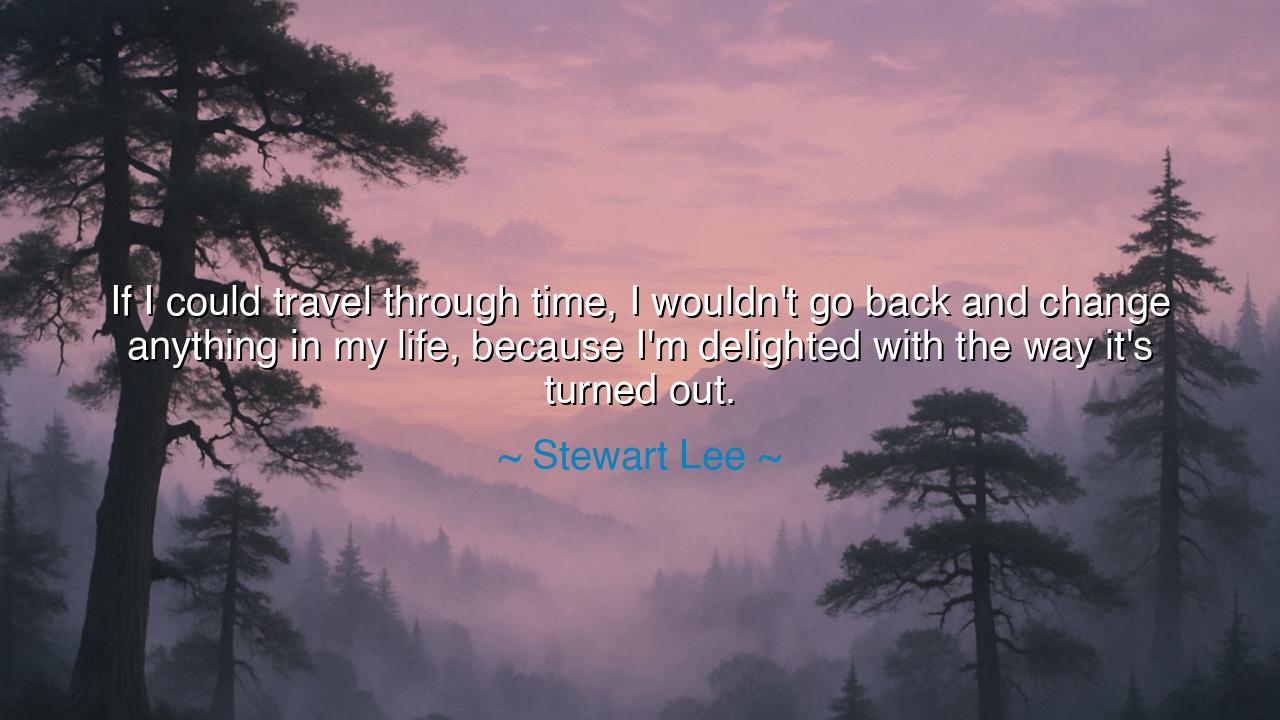
If I could travel through time, I wouldn't go back and change
If I could travel through time, I wouldn't go back and change anything in my life, because I'm delighted with the way it's turned out.






Hear the voice of Stewart Lee, who, though a man of wit and irony, speaks here with the calmness of deep reflection: “If I could travel through time, I wouldn’t go back and change anything in my life, because I’m delighted with the way it’s turned out.” These words, though clothed in humility, shine with the radiance of acceptance. They speak of a heart no longer haunted by regret, but at peace with the twists and turns of fate, finding joy not in perfection, but in the harmony of how all paths have led to the present moment.
At the heart of this saying lies the triumph of contentment. Many dream of time travel not to witness history, but to undo their mistakes, to erase sorrow, or to repair what was broken. Yet Lee declares that he would not alter even a single step of his journey. For he knows that even the failures, the stumbles, the disappointments, have woven together into the life he now treasures. It is a teaching as old as philosophy itself: that the soul who embraces the past, without resentment, lives free in the present.
This wisdom was known to the ancients. The Stoics, such as Marcus Aurelius, taught the acceptance of fate—amor fati, the love of one’s destiny. They counseled that every hardship endured was part of the greater order of the universe, shaping the soul toward its purpose. Aurelius himself, emperor of Rome, bore wars, plagues, and betrayal, yet he wrote in his Meditations that all these things were necessary for him to be who he was. So too Lee, in modern words, echoes this timeless lesson: that the past is not an enemy, but the architect of our becoming.
Consider also the story of Nelson Mandela, who spent twenty-seven years imprisoned, cut off from his people and his freedom. Many would wish such years erased from their life. Yet Mandela later spoke that prison had given him the patience, the wisdom, and the unbreakable spirit to lead South Africa into reconciliation. He did not seek to change the past, for it had given him the strength to fulfill his destiny. Lee’s remark, though lighter in tone, shares this truth—that joy comes not from rewriting our story, but from embracing it fully.
There is a heroic element, too, in the refusal to undo mistakes. For to deny the past is to deny growth, to wish away the trials that forged us. Time travel, in Lee’s saying, becomes a symbol of temptation—the desire to smooth every rough edge of life. But he rejects that temptation. His joy comes from knowing that scars and victories alike have shaped him into the man who can now say, with honesty, that he is delighted. This is the mark of maturity: not the absence of error, but the integration of error into wisdom.
Yet his words are also motivational. For they remind us that one can live so fully, so truthfully, that even in retrospect one would not change a thing. Imagine living in such a way that every choice, whether bold or flawed, could be accepted as part of a greater pattern of meaning. This is not a call to perfection, but to courage: to act with integrity in each moment, so that when we look back, we do not wish for erasure, but give thanks for the path we have walked.
The lesson, then, is this: do not dwell in regret, but find delight in the unfolding of your life. In practice, this means embracing mistakes as teachers, hardships as refiners, and victories as gifts. It means refusing to live in the shadow of “what if,” and instead choosing to live in the light of “what is.” Seek not to rewrite your past, but to honor it as the soil from which your present has grown.
Thus, let Stewart Lee’s words be remembered not as a jest, but as a teaching of the ancients reborn: that the greatest power is not to change the past, but to love it as it is, and in so doing, to live with peace, gratitude, and joy in the present moment. For when you can say, as he does, that you would not change a thing, you have already mastered the art of life.






AAdministratorAdministrator
Welcome, honored guests. Please leave a comment, we will respond soon